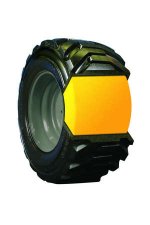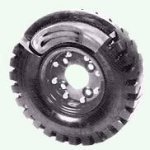In response to a reply I made to another post I decided to start a new thread, so everyone would see it. When I was having so much trouble with flats on my tractors, I did a little digging and this is some of what I found on other tractor forums.
Anti-flat foam, a popular and inexpensive motorist's emergency item available in aerosol cans, can also be used to temporarily fill tractor tires. Like anti-flat liquid, this foam does not prevent punctures but helps stop air leaks afterwards. Some people rely on this treatment as a permanent solution for flat tractor tires. Unfortunately, over several months the foam breaks down, losing its puncture sealing qualities and creating a sticky mess that has to be cleaned out of the tires eventually.
Urethane foam can be substituted for air in a tractor tire. Foam is available in several densities which approximate different inflation pressures. Once the foam sets, the tire is truly puncture proof. This is popular with construction equipment, but useful for small tractors, as well. It is expensive: $40 or more for a small tire. Foam-filled tires are several times heavier than air-filled tires. Foam-filled tires are harder on a tractor's steering mechanism than air-filled tires, since there is less "give" to the foam. For the same reason, foam-filled tires tend to create dents and ruts in the ground. Finally, foam filling does not make a thin tire stronger; in fact, it may put more stress on a light duty tire than it was designed to withstand -- resulting in a shredded tire with nothing to support the foam. So, this process is recommended only for heavy duty tires. Most industrial tire dealers provide this service.
An anti-flat liquid which resembles a thick syrup can be added to tires to slow or stop air loss from small punctures. This solution coats the inside of the tire or inner tube as the tractor moves and clogs up air leaks. Although this treatment does nothing to make tires puncture resistant, it can keep small punctures from causing tires to go flat. Unfortunately, since the solution does not completely fill the tire's inside, as the tractor sits for awhile the syrup drains to the bottom of the tire and previously sealed punctures can reopen.
Used aircraft tires, with 16 to 34 or more plies, can be found in sizes that fit many small tractors. These usually have ribbed tread, are very heavily constructed and offer excellent puncture resistance. Since they have no traction, these tires are best used for implements, wagons and as front tires on tractors. One US source for aircraft tires is GENSCO Aircraft Tires of Houston.
Patented polyurethane liquid -- shipped from Arnco in large drums or bulk containers known as “totes” and is available in four different polyurethane formulations, is pumped into the tire through its valve stem by an Certified Dealer, replacing all of the air in the tire, and cures into a resilient, synthetic rubber-like core in 24 hours. It completely eliminates flats, blowouts or other damage that can occur from nails, glass or sharp objects with air-filled tires, and works in any tire with a sound casing. Each tire and wheel is inspected for defects and the carcass is pre-stretched overnight before the tire is filled. The tire is pressurized to the recommended inflation pressure and the curing process (to a soft rubber-like material) is performed at the proper time and temperature to insure optimum filled tire performance.
The reusable R.L will bring extended tire life, better traction, and improved tire stability to your operation, resulting in a lower cost per hour of operation. The amount of reuses will depend upon the severity of your operation. But unlike the alternatives such as solid resilient or polyurethane-filled tires, the R.L. will be manufactured to match your tire's profile. To further enhance quality and durability, an advanced automation system specifies each R.L. (rubber liner) to meet the psi and load requirements for your vehicle as specified by the tire manufacturer. The R.L. for your vehicles will be custom manufactured for your specific tire profile and load requirements. The R.L.s will be inserted into the tires and mounted on your flat base wheels or rims. The unique honeycomb structure of the R.L. allows pneumatic tire flexibility, cushioning vehicles, drivers and their payloads. The Hutchinson R.L. maintains its shape and tensile strength for the life of the tire.
These appear to be made in Australia and may not be available in the USA. At least no one in my area had hear of them.
I found a number of tires shops that filled tires, but only one that could tell me what he was putting in them, so I choose him.
JD
Anti-flat foam, a popular and inexpensive motorist's emergency item available in aerosol cans, can also be used to temporarily fill tractor tires. Like anti-flat liquid, this foam does not prevent punctures but helps stop air leaks afterwards. Some people rely on this treatment as a permanent solution for flat tractor tires. Unfortunately, over several months the foam breaks down, losing its puncture sealing qualities and creating a sticky mess that has to be cleaned out of the tires eventually.
Urethane foam can be substituted for air in a tractor tire. Foam is available in several densities which approximate different inflation pressures. Once the foam sets, the tire is truly puncture proof. This is popular with construction equipment, but useful for small tractors, as well. It is expensive: $40 or more for a small tire. Foam-filled tires are several times heavier than air-filled tires. Foam-filled tires are harder on a tractor's steering mechanism than air-filled tires, since there is less "give" to the foam. For the same reason, foam-filled tires tend to create dents and ruts in the ground. Finally, foam filling does not make a thin tire stronger; in fact, it may put more stress on a light duty tire than it was designed to withstand -- resulting in a shredded tire with nothing to support the foam. So, this process is recommended only for heavy duty tires. Most industrial tire dealers provide this service.
An anti-flat liquid which resembles a thick syrup can be added to tires to slow or stop air loss from small punctures. This solution coats the inside of the tire or inner tube as the tractor moves and clogs up air leaks. Although this treatment does nothing to make tires puncture resistant, it can keep small punctures from causing tires to go flat. Unfortunately, since the solution does not completely fill the tire's inside, as the tractor sits for awhile the syrup drains to the bottom of the tire and previously sealed punctures can reopen.
Used aircraft tires, with 16 to 34 or more plies, can be found in sizes that fit many small tractors. These usually have ribbed tread, are very heavily constructed and offer excellent puncture resistance. Since they have no traction, these tires are best used for implements, wagons and as front tires on tractors. One US source for aircraft tires is GENSCO Aircraft Tires of Houston.
Patented polyurethane liquid -- shipped from Arnco in large drums or bulk containers known as “totes” and is available in four different polyurethane formulations, is pumped into the tire through its valve stem by an Certified Dealer, replacing all of the air in the tire, and cures into a resilient, synthetic rubber-like core in 24 hours. It completely eliminates flats, blowouts or other damage that can occur from nails, glass or sharp objects with air-filled tires, and works in any tire with a sound casing. Each tire and wheel is inspected for defects and the carcass is pre-stretched overnight before the tire is filled. The tire is pressurized to the recommended inflation pressure and the curing process (to a soft rubber-like material) is performed at the proper time and temperature to insure optimum filled tire performance.
The reusable R.L will bring extended tire life, better traction, and improved tire stability to your operation, resulting in a lower cost per hour of operation. The amount of reuses will depend upon the severity of your operation. But unlike the alternatives such as solid resilient or polyurethane-filled tires, the R.L. will be manufactured to match your tire's profile. To further enhance quality and durability, an advanced automation system specifies each R.L. (rubber liner) to meet the psi and load requirements for your vehicle as specified by the tire manufacturer. The R.L. for your vehicles will be custom manufactured for your specific tire profile and load requirements. The R.L.s will be inserted into the tires and mounted on your flat base wheels or rims. The unique honeycomb structure of the R.L. allows pneumatic tire flexibility, cushioning vehicles, drivers and their payloads. The Hutchinson R.L. maintains its shape and tensile strength for the life of the tire.
These appear to be made in Australia and may not be available in the USA. At least no one in my area had hear of them.
I found a number of tires shops that filled tires, but only one that could tell me what he was putting in them, so I choose him.
JD

